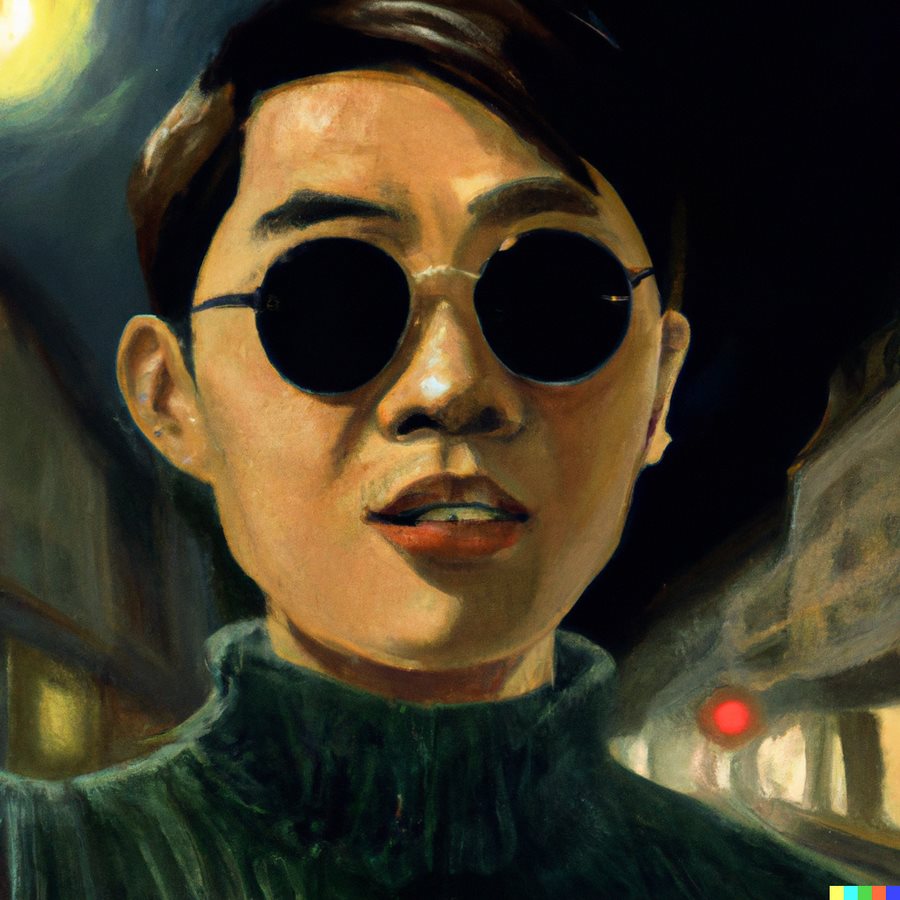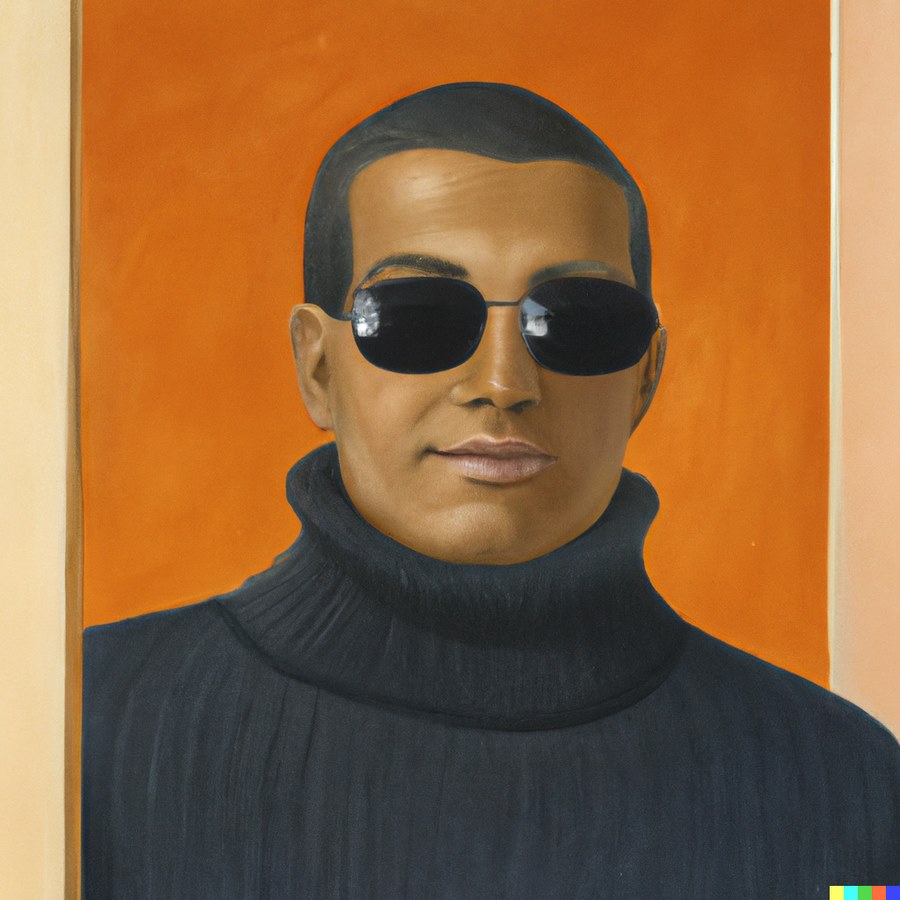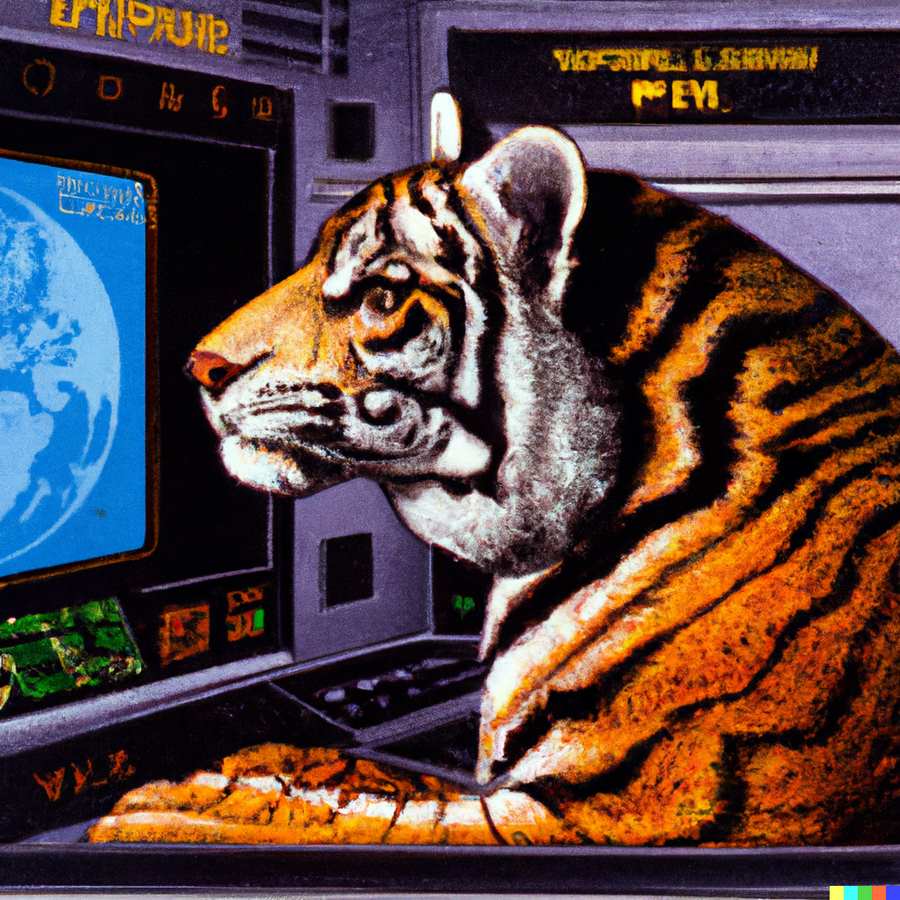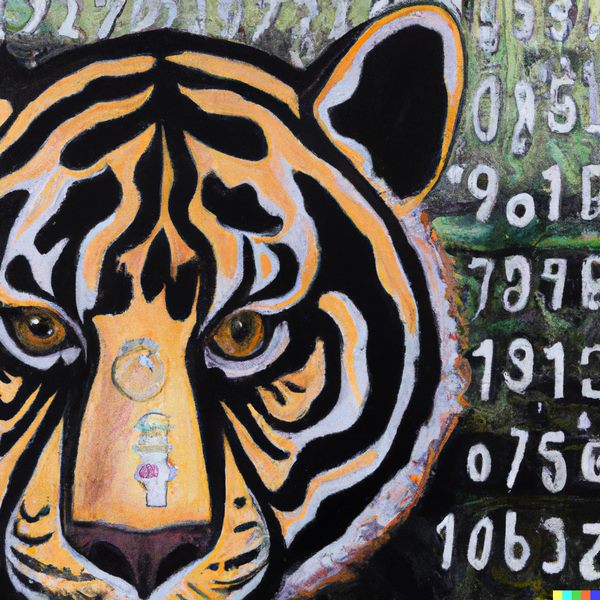

Co-Creating Media with AI
A personal playground to learn what is already possible with AI and what might be possible in the near future.
Co-Creating Media with AI
My personal playground to learn what is already possible with AI and what might be possible in the near future.
Reflecting on AI (1)
Reflecting on AI (1)

Seo-jun Reinier O’Connor
From the AI Tiger series: "People who do not exist, but know something about AI."
Image and person’s name created by AI
Text: Human
I am surrounded by fabulous podcasts, newsletters, magazines, blogs, tweets, Instagram posts, streaming services, and media libraries. With so many great offerings, there’s simply not enough time in the day to enjoy them all. To manage my media consumption, I follow the advice of Guardian author Oliver Burkeman, who recommends treating attention like money, as both are limited resources. When we devote our attention to one thing, it becomes unavailable for others. As such, we should be just as selective with our attention as we are with our money, not giving it to everyone who asks.
The concept is straightforward, but now AI chatbots like ChatGPT-4 are entering the market, seeking my undivided attention – and they’re getting it, currently even in abundance. If my attention continues to shift from traditional media offerings to chatbots, and if many others behave similarly, will media usage time for other platforms inevitably decrease?
One may wonder whether a chatbot even qualifies as a media offering. In the case of ChatGPT-4, I would say it does, at least subjectively. The chatbot continuously generates new content for me to read, capturing my attention. The fact that this content is based on probability calculations rather than editorial work is secondary in terms of media usage time. The source of the content is less important than the chatbot’s ability to engage my attention – or, as the saying goes: “It doesn’t matter whether a cat is black or white, as long as it catches mice.”
Does ChatGPT-4 also request my financial contribution? Indeed, I support the AI by paying a 23.80-dollar monthly subscription fee to OpenAI. By doing so, I adhere to Oliver Burkeman’s recommendation, allocating both my money and attention…

Zofia Gabriela Hjortfjell
From the AI Tiger series: "People who do not exist, but know something about AI."
Image and person’s name created by AI
Text: Human
My programming skills are modest at best, but that’s turned out to be an advantage. I don’t think like a developer when creating my prompts. Command lines? Curly braces? Not my thing. I approach this field as a communicator: chat with the machine, clearly explain your intentions, and what you want it to do—maybe with some examples. Then you run the LLM and set it free. With a stroke of luck, the response turns golden. Essentially, that’s what ChatGPT-4 is all about.
I’m convinced that top-notch prompt design hinges on a healthy dose of imagination. That’s why I think the best prompt designers come from fields like creative writing, where out-of-the-box thinking is essential. Screenwriters and savvy journalists, for example, lead the pack.
Interestingly, programmers and developers aren’t as prominent in this field. Their approach, bluntly put, leans more towards thinking between the realms of 0 and 1. In natural language prompt engineering for LLMs, there are no clear commands, instructions, or even a distinct structure—the complete opposite of programming. Perhaps it’s their clever approach to the division of labor: “We coders build the Large Language Models, and you creatives get to play around with it.” After all, creating is often more enjoyable than simply using what others have built.

Levi Loup Moreau
From the AI Tiger series: "People who do not exist, but know something about AI."
Image and person’s name created by AI
Text: Human
ChatGPT 3-5’s answers always sound very plausible. Even if the answer sometimes is complete nonsense at second glance. The AI writes grammatically perfect paragraphs, but it’s the depth and the reflection of the content that still isn’t there. And, as far as I know, AI does not understand irony. So, it is never funny on purpose, only by accident.
As a result, one could argue: ChatGPT is not ready for commercial scale. But this is just the first (public) version. The next version of ChatGPT is supposed to come out this year. People say it will be trained on some hundred times more data. And it will probably be much more sophisticated in terms of how many kinds of different things it can do. If that is the case, discussions about commercial use would immediately intensify.

Seo-jun Reinier O'Connor
From the AI Tiger series: "People who do not exist, but know something about AI."
Text: Human
I am surrounded by fabulous podcasts, newsletters, magazines, blogs, tweets, Instagram posts, streaming services, and media libraries. With so many great offerings, there’s simply not enough time in the day to enjoy them all. To manage my media consumption, I follow the advice of Guardian author Oliver Burkeman, who recommends treating attention like money, as both are limited resources. When we devote our attention to one thing, it becomes unavailable for others. As such, we should be just as selective with our attention as we are with our money, not giving it to everyone who asks.
The concept is straightforward, but now AI chatbots like ChatGPT-4 are entering the market, seeking my undivided attention – and they’re getting it, currently even in abundance. If my attention continues to shift from traditional media offerings to chatbots, and if many others behave similarly, will media usage time for other platforms inevitably decrease?
One may wonder whether a chatbot even qualifies as a media offering. In the case of ChatGPT-4, I would say it does, at least subjectively. The chatbot continuously generates new content for me to read, capturing my attention. The fact that this content is based on probability calculations rather than editorial work is secondary in terms of media usage time. The source of the content is less important than the chatbot’s ability to engage my attention – or, as the saying goes: “It doesn’t matter whether a cat is black or white, as long as it catches mice.”
Does ChatGPT-4 also request my financial contribution? Indeed, I support the AI by paying a 23.80-dollar monthly subscription fee to OpenAI. By doing so, I adhere to Oliver Burkeman’s recommendation, allocating both my money and attention…

Zofia Gabriela Hjortfjell
From the AI Tiger series: "People who do not exist, but know something about AI."
Image and person’s name created by AI / Text: Human
My programming skills are modest at best, but that’s turned out to be an advantage. I don’t think like a developer when creating my prompts. Command lines? Curly braces? Not my thing. I approach this field as a communicator: chat with the machine, clearly explain your intentions, and what you want it to do—maybe with some examples. Then you run the LLM and set it free. With a stroke of luck, the response turns golden. Essentially, that’s what ChatGPT-4 is all about.
I’m convinced that top-notch prompt design hinges on a healthy dose of imagination. That’s why I think the best prompt designers come from fields like creative writing, where out-of-the-box thinking is essential. Screenwriters and savvy journalists, for example, lead the pack.
Interestingly, programmers and developers aren’t as prominent in this field. Their approach, bluntly put, leans more towards thinking between the realms of 0 and 1. In natural language prompt engineering for LLMs, there are no clear commands, instructions, or even a distinct structure—the complete opposite of programming. Perhaps it’s their clever approach to the division of labor: “We coders build the Large Language Models, and you creatives get to play around with it.” After all, creating is often more enjoyable than simply using what others have built.

Levi Loup Moreau
From the AI Tiger series: "People who do not exist, but know something about AI."
Text: Human
ChatGPT 3-5’s answers always sound very plausible. Even if the answer sometimes is complete nonsense at second glance. The AI writes grammatically perfect paragraphs, but it’s the depth and the reflection of the content that still isn’t there. And, as far as I know, AI does not understand irony. So, it is never funny on purpose, only by accident.
As a result, one could argue: ChatGPT is not ready for commercial scale. But this is just the first (public) version. The next version of ChatGPT is supposed to come out this year. People say it will be trained on some hundred times more data. And it will probably be much more sophisticated in terms of how many kinds of different things it can do. If that is the case, discussions about commercial use would immediately intensify.
“Innovation means that you don’t know what you are doing. Otherwise you don’t innovate.”

Sterling James Green
King of Quotes
From the AI Tiger series: “People who do not exist, but know something about AI.”
Text: Human / Image and person’s name created by AI
Little Creatures
Natural Language to Code Generation
Just breathe.
Isn’t that cool? I think of a simple shape and contemplate what a suitable animation could look like. I try to describe this shape to ChatGPT-4 as best as possible and ask for the corresponding CSS code. I copy the suggested code into the appropriate fields on the website and wait to be surprised by what comes out.
If I like the result, I tweak the variables offered to me, like speed, shape, and colors, just a bit. And voilà, a new little digital creature is born. And since they are published in the AI-Tiger Magazine, the series is aptly named – Little Creatures.
AI Tiger jr. Stuff
Ask the language model
The Next Beat: How image generators are following the path of Hip-Hop
What drum machines and sampling once made possible, image generators now enable.
Impact of Integrating a Chatbot into a Search Engine
Learn about the benefits and challenges of integrating a chatbot like ChatGPT into a search engine and what it could mean for users and companies like Google.
Meet ChatGPT: The Lovable Language Model Making Waves in the Tech World
Join AI-Tiger as he sits down with ChatGPT, the revolutionary language model developed by OpenAI. Find out how ChatGPT works and what it's capable of, and get a glimpse into the future of AI and machine learning.
AI Tiger jr. Stuff
Ask the language model

DEBATE
Talking with ChatGPT about Education

DEBATE
Talking with ChatGPT about Education
Revolutionary or Risky? Controversial Dialogue on the Use of AI in Education.
Teachers Debate the Pros and Cons of Using AI in Education: Who's Right and Who's Wrong
ChatGPT: Homework Tool or Learning Crutch?
Is ChatGPT a helpful resource for students or a substitute for human guidance? We weigh the pros and cons of introducing this language model to your tech-savvy child.
Reflecting on AI (2)
Reflecting on AI (2)

Riley Amara Shah
From the AI Tiger series: "People who do not exist, but know something about AI."
Image and person’s name created by AI
Text: Human
AI saves time and increases labour productivity per person many times over. So AI has the potential to transform the entire global economy. How much faster will everyone be? Imagine integrating an AI like ChatGPT into the legal system, into medicine, into science, into finance. Into media, into art (already happened), into gaming. You name it. And this is probably happening all at the same time.
Sounds crazy? It is not. I think Yuval Harari mentioned in one of his fantastic books that all the world’s trade in the 15th century could be done today with four or five large container ships. In other words, a person today is perhaps a thousand times more productive on average than a hundred years ago. What will happen if, in the next few years, AI increases that productivity by another hundred times? To be honest, the idea of such acceleration makes my head spin.

Miguel Angel Rodriguez
From the AI Tiger series: "People who do not exist, but know something about AI."
Image and person’s name created by AI
Text: Human
This could be huge. A one-stop shop for corporate answers. Imagine a large language model like ChatGPT but for your own corporate data, the ultimate corporate data BFF*.
Imagine having all your org’s info at your fingertips, just a question away. The AI scours through all your PowerPoints, Cloud docs, Wikipedia-style knowledge bases and more and comes back with the perfect answer, summarizing exactly what you should do. No more sifting through endless pages, the AI gives you the gist, backed up with references so you can double-check that the data are adequate.
And the cherry on top? You don’t even have to open a single document – the AI summarizes everything for you. This would be really a whole new level, a reinvention of search.
*Best Friends Forever

Riley Amara Shah
From the AI Tiger series: "People who do not exist, but know something about AI."
Image and person’s name created by AI / Text: Human
AI saves time and increases labour productivity per person many times over. So AI has the potential to transform the entire global economy. How much faster will everyone be? Imagine integrating an AI like ChatGPT into the legal system, into medicine, into science, into finance. Into media, into art (already happened), into gaming. You name it. And this is probably happening all at the same time.
Sounds crazy? It is not. I think Yuval Harari mentioned in one of his fantastic books that all the world’s trade in the 15th century could be done today with four or five large container ships. In other words, a person today is perhaps a thousand times more productive on average than a hundred years ago. What will happen if, in the next few years, AI increases that productivity by another hundred times? To be honest, the idea of such acceleration makes my head spin.

Miguel Angel Rodriguez
From the AI Tiger series: "People who do not exist, but know something about AI."
Text: Human
This could be huge. A one-stop shop for corporate answers. Imagine a large language model like ChatGPT but for your own corporate data, the ultimate corporate data BFF*.
Imagine having all your org’s info at your fingertips, just a question away. The AI scours through all your PowerPoints, Cloud docs, Wikipedia-style knowledge bases and more and comes back with the perfect answer, summarizing exactly what you should do. No more sifting through endless pages, the AI gives you the gist, backed up with references so you can double-check that the data are adequate.
And the cherry on top? You don’t even have to open a single document – the AI summarizes everything for you. This would be really a whole new level, a reinvention of search.
*Best Friends Forever
DALL-E paints TIGERS
Is it art? Probably not, it’s just a bunch of pixels on your screen. But the emotion the pixels evoke is real.
Reflecting on AI (3)
Reflecting on AI (3)

Rania Farida Ali
From the AI Tiger series: "People who do not exist, but know something about AI."
Image and person’s name created by AI
Text: Human
I am curious to see which historical comparison will win the race to describe the changes that artificial intelligence is bringing. In the running are comparisons to the “iPhone moment,” the introduction of electricity, or the spread of the Internet. And, of course, the really big one, the comparison with the Industrial Revolution.
These are all events whose implications we humans only understood much later. Or rather, we are still in the process of understanding them. Or will never understand. Why does electricity come out of the socket again, ChatGPT?
In any case, everything will be very different from what we imagine now. Because when you give people a new technology, they do amazing things with it. But rarely exactly what the original intention was. Or as I was just told in the ChatGPT role-playing game “Act if…” Arya Stark just called out to me: “Just as a sword can be used for good or evil, AI can be a tool for truth or deceit. It all depends on our hands.”
Is winter coming? No, I think it will be a fantastic AI-summer.

Rania Farida Ali
From the AI Tiger series: "People who do not exist, but know something about AI."
Image and person’s name created by AI / Text: Human
I am curious to see which historical comparison will win the race to describe the changes that artificial intelligence is bringing. In the running are comparisons to the “iPhone moment,” the introduction of electricity, or the spread of the Internet. And, of course, the really big one, the comparison with the Industrial Revolution.
These are all events whose implications we humans only understood much later. Or rather, we are still in the process of understanding them. Or will never understand. Why does electricity come out of the socket again, ChatGPT?
In any case, everything will be very different from what we imagine now. Because when you give people a new technology, they do amazing things with it. But rarely exactly what the original intention was. Or as I was just told in the ChatGPT role-playing game “Act if…” Arya Stark just called out to me: “Just as a sword can be used for good or evil, AI can be a tool for truth or deceit. It all depends on our hands.”
Is winter coming? No, I think it will be a fantastic AI-summer.
JUST DO IT





